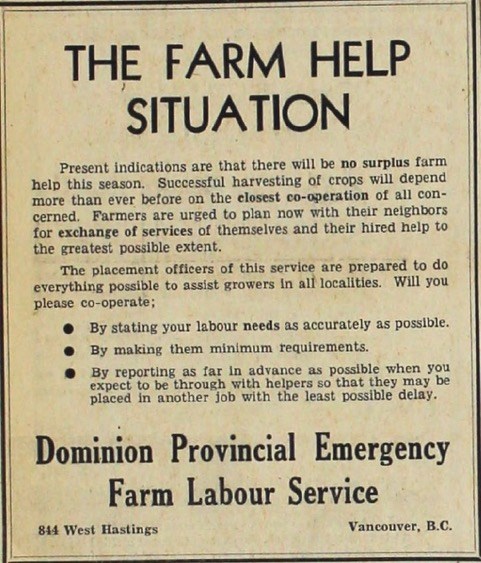Employers may complain about a labour shortage today, but try running a farm during the Second World War.
Richmond’s furtile soil was in demand given food shortages and war rations at the time, but with so many young men at the front and the local Japanese community interned, harvesting and getting produce to market was no small task.
Add to that the fact most of the transportation vehicles were being used to support the war efforts, and farmers were doubly challenged.
To illustrate just how hard up people were, Wally Paulik, whose family owned Paulik farm in Richmond during the war, told a funny story that describes the situation experienced by both farmers as well as regular citizens.
As well as the farm, Wally’s folks owned a lampshade store on Main Street in Vancouver. One day a man threw a brick into the lamp shade store window. Max Paulik caught the fellow and found out that he had only thrown the brick so he could go to jail and get some food and a place to sleep. Max offered him work on the farm, spading and gardening for room and board.
The would-be criminal was hired and turned out to be a fantastic worker.
Wally Paulik told the story after being invited to speak to the Richmond Garden Club to give us a historical reference on our beloved Paulik Park, a six-acre city park in the middle of Richmond.
The city purchased the land from the Paulik family mid-2000 and Richmond Garden Club adopted the care of the perennial gardens in 2008. The Club members and community volunteers continue to care for the gardens today.
The Paulik family owned a farm on this land back in the late 1920s. The Paulik family consisted of Dr. Max Paulik, a trained forester, who worked in the forests of Europe and the Soviet Union, and his wife Irene Paulik, who designed the perennial garden beds in Paulik Park. Their children, Wilmar (Will), Igor (Egar), Waldemar (Wally) and Valentine (Val), were put to work at an early age to help run the farm.
The Paulik farm was just one of many in Richmond providing produce for the whole of the Lower Mainland. In fact, in its early years, Richmond’s agriculture and fishing industries became known as Vancouver’s “bread basket.”
It is interesting to note that on July 20, 1942, the Veterans’ Land Act passed, forming thousands of small one to two acre plots of farmland for veterans, setting the stage for future “hobby farms.” We still have some of those hobby farms in Richmond.
Today, we can easily see how valuable farmland was for folks to survive during those tough war years. We need to continue to protect our remaining farmland, because in a time of crisis, it may be the most important thing we have.
Lynda Pasacreta is the current president of the Richmond Garden Club.



